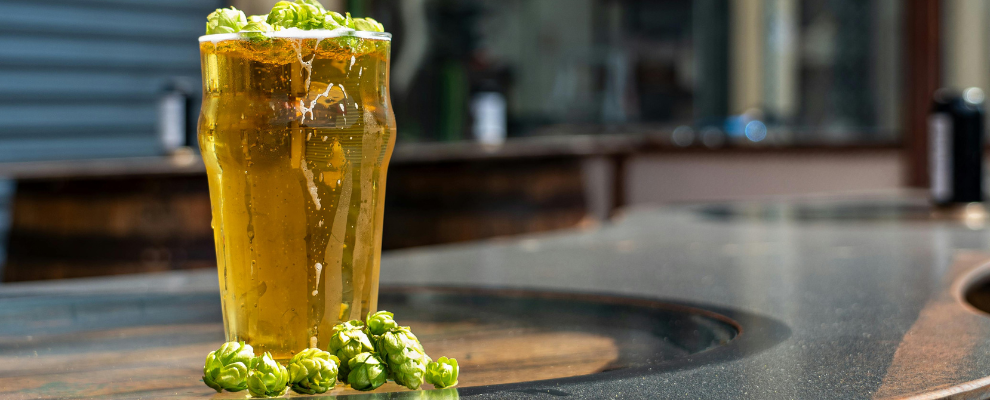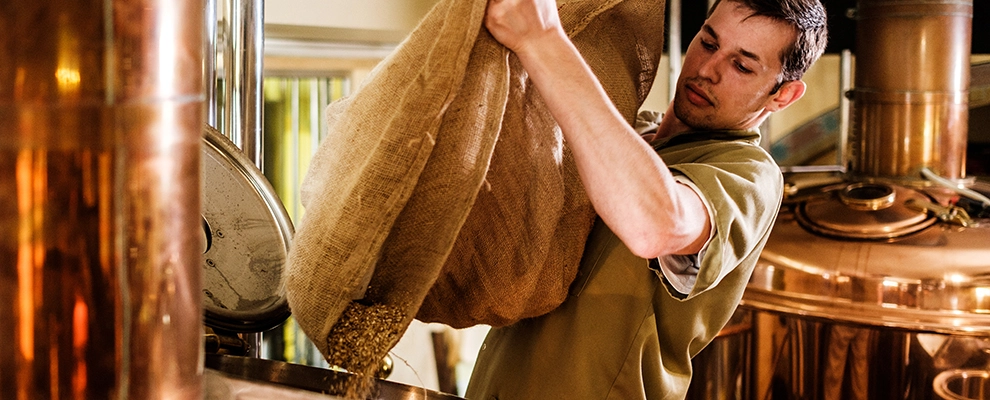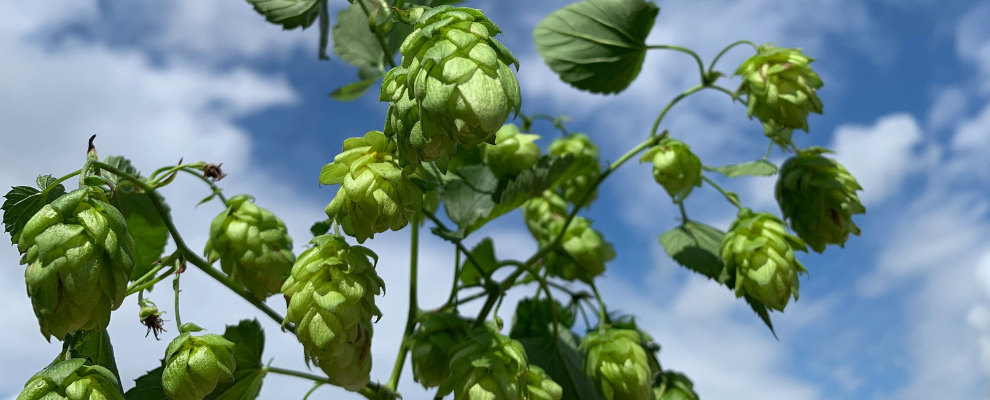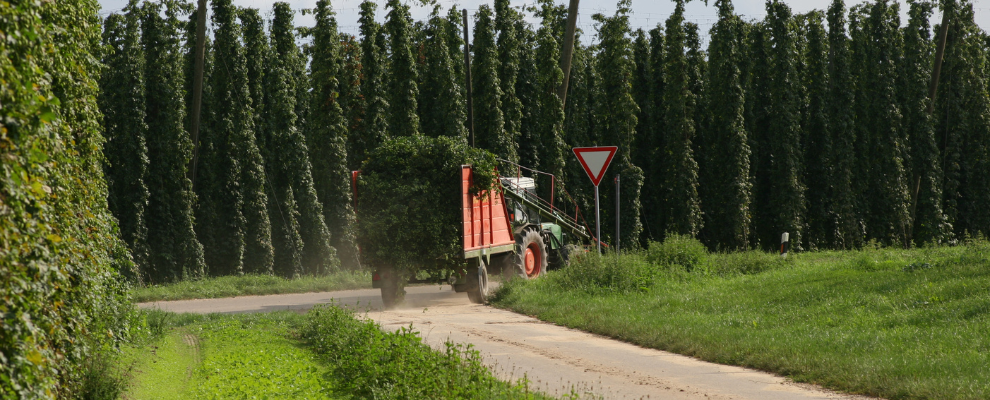
published at: 18/06/2025
Market Report 02/2025
In the most important hop-growing countries – Germany and the USA – acreage is declining significantly. Our current report shows what this means for the market.

published at: 18/06/2025
In the most important hop-growing countries – Germany and the USA – acreage is declining significantly. Our current report shows what this means for the market.

published at: 23/05/2025
More aroma, more depth: Learn all about the technique, perfect timing, and best hop varieties for dry hopping your beer.

published at: 15/04/2025
The legal requirements for the use of pesticides in hop cultivation are becoming increasingly strict. Learn more about what this means in the current market report.

published at: 13/02/2025
Discover what sets these classics of German brewing tradition apart – with style profiles, brewing tips, and recommended hop varieties.

published at: 30/10/2024
Once again this year, the alpha values of the hops from the 2024 harvest have been published by the Hop Analysis Working Group (AHA). You can find a detailed overview in our latest article.

published at: 25/10/2024
Due to weather conditions, the 2024 harvest began approximately 7 days later. The hop harvest concluded last week. Initial data and facts can be found in our latest market report.
Last year we accompanied two hop growers with a camera during the harvest. The result can be viewed as the following video:
Hops are cultivated as a perennial climbing plant that requires special climbing supports to grow. The plant needs plenty of sunlight, sufficient water, and well-drained soil.
The hops harvest typically takes place between August and September. The harvest time varies depending on the climate and geographical location.
After harvesting, hops are dried to reduce moisture and improve shelf life. The hop cones are then processed into either whole flowers or pellets.
Hops are primarily used in brewing beer for flavoring, bitterness, and preservation. The essential oils and bitter compounds in hops give beer its characteristic taste and help keep it fresh for longer.
The alpha acid content in hops determines its bitterness. Brewers use hops with varying alpha acid levels to control the bitterness of their beer and achieve the desired taste.
Hops should be stored in a cool, dry, and airtight environment to maintain their quality and freshness. Ideally, hops are kept in a refrigerator or freezer.
There are numerous varieties of hops with different aroma profiles and bitterness levels. Some of the most well-known varieties include Cascade, Hallertauer Mittelfrüh, and Tettnanger.
Hops are grown in many regions worldwide, including Germany, the USA, the Czech Republic, England, and New Zealand. The conditions for hops cultivation vary by region.
The quality of hops is determined by various factors, including alpha acid content, aroma profile, freshness, and purity. Certified quality controls and laboratory tests help brewers identify high-quality hops.
Hops cultivation can impact the environment through water and resource consumption, the use of fertilizers and pesticides, and effects on biodiversity. Sustainable farming practices can help minimize these impacts and reduce the ecological footprint.
Hops play a crucial role in the brewing process, providing beer with its characteristic flavor, aroma, and bitterness. Additionally, hops act as a natural preservative, extending the beer's shelf life.
Hop pellets are small, compressed forms of ground hop cones, offering a convenient and easy-to-dose form of hops. They are made by crushing and pressing dried hop cones and offer a longer shelf life than whole flowers.
Hops contribute to the stability and formation of a dense and durable foam head. The proteins and bitter compounds in hops support foam formation and improve the quality of the beer's head.
Yes, there is organic hops, which are grown under strict ecological guidelines that prohibit the use of chemical pesticides and fertilizers. Organic hops differ from conventionally grown hops through sustainable farming methods and potentially higher purity and quality.
The raw hops are sieved and cleaned of coarse impurities, then dried out to a humidity of approx. 8 – 10%. They are then pressed into 5 kg rectangular blocks and vacuum-packed in aluminium compound foil.
The raw hops are sieved and cleaned of coarse impurities, then dried out to a humidity of approx. 8 – 10%. Then the raw hops are ground down into powder. The powder is pressed through a matrix – and the pellets are formed. In the next production step they are packed in aluminium compound foil with the addition of a CO₂/N2-gas mixture. This is to make sure that no quality-damaging oxygen is in the foil. From 100 kg of raw hops approx. 90 kg pellets are made, hence the term „P90“.
With the manufacture of P45 the first production steps are identical with P90. The extracted powder is however then sieved over belts at a temperature of -35 °C. During this process the lupulin glands lose their stickiness. The lupulin separates from the spent hop cones. In this way an mechanical enrichment of the alpha acid content takes place. The alpha acid content can be adjusted according to the wishes of the customer by adding the hop cones later on e.g to 10,0 %. The pelletising and packing is the same as with the P90. Pellets weighing 45 kg can be extracted from approx. 100 kg raw hops – the pellets are called „P45“.
Solely α-acids, β-acids, essential oils and other soft resin componets of hops were extracted from the raw hops using CO₂ (carbon dioxide). The determination of the α-acids are carried out with the analysis method EBC 7.7. HPLC. The processing costs are higher than those of the ethanol pure resin extract. An additional production step is required to extract the Xanthohumol from the spent hop cones which are used to extract the CO₂ pure resin. Generally CO₂ extracts are preferred abroad.
As well as the alpha acids, iso-α-acids, β-acids, chlorophyll and other pigments were extracted. Determination of the bitterness by means of the conductivity of bitterness measurement, analysis method EBC 7.6. + ½ EBC 7.8.HPLC. As more bitter substances are determined with the conductivity of bitterness measurement, the yield with ethanol pure resin extract is higher than the CO₂ pure resin extract. Relevant for large breweries is the fact that the ethanol pure resin extract requires a lower temperature (less energy required) than the CO₂ pure resin extract in order to be suitable for pumping. Xanthohumol, which is found in ethanol pure resin extract, possesses anticarcinogenic properties. There is no difference in taste to the CO₂ pure resin extract.